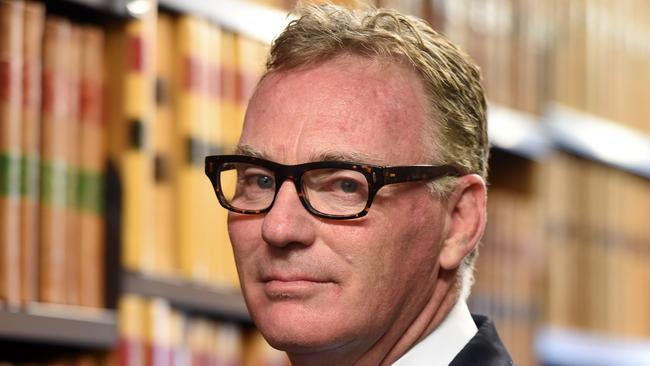Family courts at breaking point as Chief Justice Will Alstergren admits parents face ‘unacceptable delays’
Parents face ‘unacceptable delays’ as COVID-19, unfilled vacancies and judges unable to keep up with workloads stretch the bench.

The chief justice of the Family Court says some parents are facing “unacceptable delays’’ as disruption caused by COVID-19, unfilled vacancies and judges being unable to keep up with their workloads stretch the bench to breaking point.
At least two Federal Circuit Court judges have put off hearings to clear case backlogs, and a third family law judge is on indefinite leave, with some parents being told their cases will only be heard before Christmas if they fall into the most urgent categories, ¬including child safety and homelessness.
Three Federal Circuit Court judges who recently retired have not been replaced — Melbourne-based Ron Curtain who finished last week and two general federal law judges — while the position of Family Court judge Ian Loughnan, who retired in July, is yet to be filled.
Chief Justice Will Alstergren, who has been the head of both the Family Court and lower-level Federal Circuit Court since December 2018, said Sydney was facing the biggest backlogs.
The Federal Circuit Court handles almost 90 per cent of family law disputes as well as general federal law cases.
“There is no doubt there is a backlog in Sydney and we’re desperately trying to do something about it,” Chief Justice Alstergren said. “We recognise there are unacceptable delays. We were actually having an impact until COVID hit and that made it a bit of a challenge.”
In Sydney, Federal Circuit Court judge Bruce Smith has cancelled interim hearings due to occur before Christmas because his lists were overloaded.
Practitioners were told in an email, seen by The Australian, that, “due to unprecedented demand for court time”, the court could not hear the cases unless they met the court’s criteria for urgency until next year. Families involved in about 13 cases, some of whom had been waiting for six months, had their interim hearings cancelled. The urgent cases will be heard by other judges or registrars before Christmas.
Another judge, Dillon Morley, is on reduced sittings to clear his backlog of judgments. The Australian reported earlier this year that families were facing delays to receive his ¬decisions. Another Federal Circuit Court judge, who The Australian has chosen not to name, is on indefinite leave.
Family lawyers say that litigants are commonly waiting four years for a final hearing in the Family Court and three years in the lower-level Federal Circuit Court in Sydney and Parramatta.
In some cases it has been impossible to get dates for interim hearings to decide what parenting or property arrangements should be in place while families await final hearings, practitioners say.
Law Council president Pauline Wright said family law was complex, emotionally charged and life-altering for children — but the system was chronically under-resourced and judges were facing “crippling pressures”.
“Judges must be better supported to undertake this critical work,” Ms Wright said.
“The legal profession has consistently warned that this poses significant occupational health and safety concerns … these concerns must no longer be ignored.”
Federal Circuit Court judges and staff are still reeling after Judge Guy Andrew committed suicide last month. He had been the court’s sole judge in Townsville but had been moved to Brisbane for mentoring after coming under fire from the full Family Court for bullying.
Women’s Legal Services Australia spokeswoman Angela Lynch said the delays put pressure on family violence victims to negotiate outcomes with perpetrators, who were often able to grind women down. “For the more vulnerable parties, and ultimately for children, these issues are of grave concern,” she said. “It’s not just the resourcing of the court itself … but the wider system is also under enormous strain: community legal centres, women’s legal services and legal aid officers.”
The Weekend Australian revealed on October 24 that the sole Federal Circuit Court judge in Rockhampton, Anne Demack, took seven years to deliver a decision in a parenting case involving two vulnerable children. In 2018, The Australian revealed she had two judgments outstanding for four years.
Ms Wright said her concern was not isolated to cases involving specific judges, but the cases did “sound the alarm for a deeper problem” needing immediate attention. “This is not about any individual judge or any individual registry; this is a national issue in a national system that is failing those it serves, and those who serve within it,” she said.
The Morrison government has been slow to replace judges who have retired. It took five months to replace family law judge Judy Small in Melbourne, and another three judges will have to stop sitting soon because they are due to reach the mandatory retirement age.
The pandemic has caused a spike in urgent applications, with 395 families seeking the courts’ help to deal with disrupted parenting arrangements. The fact hearings have not been occurring face to face has resulted in fewer cases settling.
Chief Justice Alstergren said he expected judicial appointments to be announced soon and that funding for an extra family law judge and five registrars announced in the budget would help, but it would take about six months for the full impact to be felt on the family law system.
Attorney-General Christian Porter said the government was committed to improvements so families could “resolve matters safely, fairly and quickly” and its plan to merge the Family Court and Federal Circuit Court was designed to achieve that.
He said the last budget included funding of $140m over four years for the courts, the ¬majority to expedite family law cases. Any extra funding would be tied to the courts merger because there was “little point pushing more funding into a failed structure”. The Law Council, which is deeply opposed to the courts merger, has said the funding set aside in the budget was inadequate to address the present crisis and reverse years of chronic underfunding.
A parliamentary inquiry into the family law system is due to be completed in February.
Do you know more? berkovicn@theaustralian.com.au
Do you know more? berkovicn@theaustralian.com.au







To join the conversation, please log in. Don't have an account? Register
Join the conversation, you are commenting as Logout